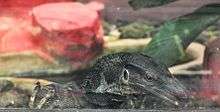Roughneck monitor lizard
| Black roughneck monitor lizard | |
|---|---|
 | |
| Scientific classification | |
| Kingdom: | Animalia |
| Phylum: | Chordata |
| Class: | Reptilia |
| Order: | Squamata |
| Suborder: | Lacertilia |
| Family: | Varanidae |
| Genus: | Varanus |
| Subgenus: | Empagusia |
| Species: | V. rudicollis |
| Binomial name | |
| Varanus rudicollis (Gray, 1845)[1] | |
The black roughneck monitor lizard, Varanus rudicollis, is a species of monitor lizard found in Southeast Asian countries of Thailand, Burma, and Malaysia. It is also found in Indonesia on Sumatra and islands of the Rhio Archipelago[2] It is sometimes known simply as the roughneck monitor lizard.[3]In Thailand is called h̄èā cĥāng (Thai: เห่าช้าง; "elephant bark"), is believed to be toxic animals. Can bite human to death.[4]
The habitat of Varanus rudicollis is limited to primary and secondary rainforest and mangrove swamps.[5] In the wild the black roughneck monitor is very rarely seen, but whether this is because of its rarity or its very secretive behavior is uncertain.[1] They are often kept successfully in captivity, but have a shy disposition.[1][6]
Description
The roughneck is a medium to large monitor. It usually reaches an average adult size of 3–4 ft. (90–120 cm), with a maximum length of 5 feet (150 cm), reported.[6] The rough-necked monitor can be easily recognised by large pointed scales adorning the necks of adults.[2]
References
- 1 2 3 "Monitor-lizards.net".
- 1 2 "Indonesiatraveling.com".
- ↑ JCVI.org
- ↑ "อ.เจษฎา เร่งแจง เห่าช้าง เป็นสัตว์กลุ่มตะกวด ไม่ใช่งู-ไม่มีพิษ". Kapook.com (in Thai). 12 June 2015. Retrieved 16 June 2016.
- ↑ Mampam.com
- 1 2 "Herpcenter.com".
- (1992). Reproductive notes on the black roughneck monitor lizard (Varanus rudicollis Gray, 1845). VaraNews 3(2): 3.
Further reading
- Photos at Redtailboa.net
- Photos at Museumstuff.com
- Amer, Sayed A. M. and Yoshinori Kumazawa 2008. Timing of a mtDNA gene rearrangement and intercontinental dispersal of varanid lizards. Genes Genet. Syst. 83: 275–280
- Auliya, M. (2006). Taxonomy, Life History, and conservation of giant reptiles in west Kalimantan. Natur und Tier Verlag, Münster, 432 pp.
- Ávalos, J. de & Martínez Carrión, P. (1997). Warane Reptilia (Münster) 2 (5): 16-21
- Barbour, Thomas (1932). A new Bornean monitor Proceedings of the New England Zoological Club 13: 1-2
- Bayless, Mark K. 1997. The rough-neck Monitor lizard (Varanus rudicollis) Bulletin of the Chicago Herpetological Society 32 (12): 250-252
- Bennett, Daniel 1993. A review of some literature concerning the rough-necked monitor lizard Varanus rudicollis Reptilian 1 (9): 7-10
- Bennett, Daniel; Liat, Lim Boo 1995. A note on the distribution of Varanus dumerilii and V. rudicollis in Peninsular Malaysia. Malayan Nature Journal 49(2):113-116.
- Bong Heang, Kiew 1987. An annotated checklist of the herpetofauna of Ulu Endau, Johore, Malaysia Malayan Nature J. 41(2-3): 413-423.
- Boulenger, G.A. 1885. Catalogue of the lizards in the British Museum (Natural History). Vol. 2, Second edition. London, xiii+497 pp.
- De Rooij, N. de 1915. The Reptiles of the Indo-Australian Archipelago. I. Lacertilia, Chelonia, Emydosauria. Leiden (E. J. Brill), xiv + 384 pp.
- Gaulke, Maren 1991. Systematic relationships of the Philippine water monitors as compared with Varanus s. salvator, with a discussion of dispersal routes Mertensiella 2: 154-167
- Gray, J. E. 1845. Catalogue of the specimens of lizards in the collection of the British Museum. Trustees of die British Museum/Edward Newman, London: xxvii + 289 pp.
- Horn,H.G. & Peters,G. 1982. Beiträge zur Biologie des Rauhnackenwarans, Varanus (Dendrovaranus) rudicollis Gray. Salamandra 18 (1/2): 29-40
- MANGILI (1962). Giard. zool. Roma, 4: 30
- Manthey, U. & Grossmann, W. (1997). Amphibien & Reptilien Südostasiens. Natur und Tier Verlag (Münster), 512 pp.
- Taylor, E.H. 1963. The lizards of Thailand. Univ. Kansas Sci. Bull. 44: 687-1077.
- Werner, F. 1900. Reptilien und Batrachier aus Sumatra, gesammelt Herrn. Gustav Schneider jr., im Jahre 1897-1898. Zool.Jahrb. (syst) 13:479-508